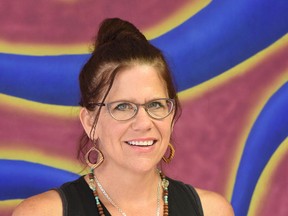Happy Healthy YOU

Article content
Kelly Spencer - Happy Healthy YOU
(A wellness column by Kelly Spencer: writer, life coach, yoga & meditation teacher, holistic healer and a mindful life enthusiast!)
“Whether you are a writer or an entertainer, you are trying to express the complications of life through a shared enterprise. That's what theatre was, always. And live performance shares that with an audience in a specific compact: the play is unfinished unless it has an audience, and they are as important as everyone else.” (Lee Hall)
Lately my husband and I have submerged ourselves into live performances in both theatrical and musical sorts. Jeff was happier than a bird with a French fry after taking in a David Wilcox concert a couple weeks ago. I had the pleasure of breaking bread and attending a play in Port Dover recently with some girlfriends. We both had the opportunity to listen to our friend Amanda and a local band called Lights of the Night sing on the patio at Kelsey’s. And this past weekend we put the cherry on the live-entertainment sundae by attending a Krishna Das Kirtan in Toronto, where everyone is taking in the musical gifts as well as participating in song and meditation.
There is something so wonderfully natural about being an audience, a witness to the creative expression of another human. It’s more than that though. Although you do observe, the experience is on a deeper visceral level. You feel it and it becomes a part of your map of the world.
Throughout the history of man there have been various fads and methods of passing the time and amusing ourselves, but live entertainment has proven to be one of the most resilient and durable forms of recreation, even amidst a computerized generation.
Western theatre as we know it originated in Athens, Greece. It was part of a broader culture of theatricality and performance that included festivals, religious rituals, politics, law, athletics and gymnastics, music, poetry, weddings, funerals, and symposia. The theatre portion of ancient Greece transcended to consist of three types of drama: tragedy, comedy, and the satyr play. The origins of theatre dating to 384-322 BCE and are associated with Aristotle known as the first theoretician of theatre. The performances were given in semi-circular auditoria cut into hillsides, capable of seating 10,000-20,000 people.
Music through instrument, percussion, singing and dancing has existed as far back as known. Native American ceremonial music is traditionally said to originate from deities or spirits. Their music plays a vital role in history and education with Native American rituals shaped by every aspect of song, dance and costuming, and each aspect informs about the makers, wearers and symbols important to the nation, tribe, village, clan, family, or epic legend.
One must only conclude that if live entertainment has been around for thousands of years and is still openly received and welcomed in our society today, that there must be some health benefits for us.
Neuroscientists have discovered that attentively listening to music heightens positive emotion through the reward centres of our brain, stimulating hits of dopamine that can make us feel good or even elated. Listening to music also lights up other areas of the brain. In fact, almost no brain center is left untouched.
Music’s neurological reach, and its historic role in healing and cultural rituals, has led researchers to study, conclude and integrate music for the health benefits of it. In our health care system we can use music for helping patients during post-surgery recovery (assists with pain control) or improving outcomes for people with Alzheimer’s by aiding in brain function and memory. Studies have also concluded that it can reduce stress and anxiety and boost our immune system. In some cases, music’s positive impacts on health have been more powerful than medication.
Live performances versus cinematography have also been examined. The University of Arkansas surmised that field trips to live theater enhanced literary knowledge, tolerance, and empathy among students, according to their study. The research team found that reading and watching movies of Hamlet and A Christmas Carol could not account for the increase in knowledge experienced by students who attended live performances of the plays. Students who attended live performances of the play also scored higher on the study's tolerance measure than the control group by a moderately large margin and were better able to recognize and appreciate what other people think and feel.
If you are looking for some cultural live entertainment experiences, here are some local suggestions:
* Attend restaurant live music nights
* Go to a playhouse (Tillsonburg, Port Dover, St. Thomas to name a few)
* Participate in a drum circle. (check out Matt Larmer group on Facebook “Tillsonburg Drumming Circle”)
* Yoga and Live Music at Indigo Lounge - July 11th
* Sunfest Live Music Summer Festival in London - July 9-12
* Grand River Pow Wow: Annually the fourth weekend of July
Is it perhaps the human connection? Or maybe the bouncing of molecules of energy that are palpable. Either way, I know from my own recent personal experience, live entertainment feels good. I felt happier and healthier and isn’t that what it’s all about?
(If you would like to see an article on a specific topic, please email kelly@indigolounge.ca)